#Doctrine of Election
Quote
I am a Calvinist; I believe in election and predestination; but I would not dream of putting it under the heading of essential. I put it under the heading of non-essential… You are not saved by your precise understanding of how this great salvation comes to you. What you must be clear about is that you are lost and damned, hopeless and helpless, and that nothing can save you but the grace of God in Jesus Christ and only Him crucified, bearing the punishment of your sins, dying, rising again, ascending, sending the Spirit, regeneration. Those are the essentials… While I myself hold very definite and strong views on the subject, I will not separate from a man who cannot accept and believe the doctrines of election and predestination, and is Arminian, as long as he tells me that we are all saved by grace, and as long as the Calvinist agrees, as he must, that God calls all men everywhere to repentance. As long as both are prepared to agree about these things I say we must not break fellowship. So I put election into the category of non-essentials.
Martyn Lloyd-Jones
131 notes
·
View notes
Text
The call to evangelize
Mark 16:15
And He said to them, “Go into all the world and preach the gospel to all creation.
Even though He already separated those who will be saved from before the foundation of the world (Ephesians 1:4), we don't know who they are. We are not exempt from the responsibility to preach to people (Romans 10:14).
We will try to win souls for Christ, it's our nature. Why should we want people to perish? Why would we want to be alone in heaven? As Charles Spurgeon said, "Do you want to go to heaven alone? I fear you will never go there. Have you no wish for others to be saved? Then you are not saved yourself. Be sure of that.” The apostle Paul would often try to "win" souls for Christ (1 Corinthians 9:19-22), and we should too.
Although we tell of the Good News to others, remember this: we don't save anyone, God alone does. We cannot "force" someone to believe, no matter how hard we try, for God only draws those whom He wants to Himself (John 6:44). The elect (and that's how we're called in Scripture [Matthew 24:24; Luke 18:7; Titus 1:1; Romans 8:33; etc.]) will find their way to God if they are meant to be saved; not when we want to, but when He has appointed them to.
If everyone who would be saved was born with a big, visible, letter X somewhere on their body, then we could preach only to those and ignore everyone else. However, we don't know who the elect are, therefore, we must preach to everyone all the same and hope at least a few seeds land on good soil as we hear in the Parable of the Sower (Matthew 13:1-23; Mark 4:1-20; Luke 8:4-15).
God's election doesn't diminish our evangelistic role. Charles Spurgeon talked about how "Rowland Hill, when he was asked to preach only to the elect, said that he would do so if somebody would chalk them on the back." Since we cannot know who is saved or not, we must preach all the same to everyone.
Don’t hide your faith. Don’t keep the Good News only to you. As He told His disciples, so should we “Go therefore and make disciples of all the nations, baptizing them in the name of the Father and the Son and the Holy Spirit, teaching them to observe all that I commanded you” (Matthew 28:19-20).
#predestination#doctrine of election#Reformed theology#Charles Spurgeon#C.H. Spurgeon#heaven#salvation#Good News#Rowland Hill#preach#faith#religion#Christianity#church#Bible verse#Bible quote#Christian quotes#evangelism#evangelize
16 notes
·
View notes
Text

#christianposts#christian living#dailydevotion#bibleverse#daily devotional#theology#christian quotes#christianity#scripture#faith#thomas watson#doctrine of election#chosen
0 notes
Text
What is Irresistible Grace? - Pastor Patrick Hines Podcast
What is Irresistible Grace? – Pastor Patrick Hines Podcast
37 “Everything that the Father gives Me will come to Me, and the one who comes to Me I certainly will not cast out. 38 “For I have come down from heaven, not to do My own will, but the will of Him who sent Me. 39 “And this is the will of Him who sent Me, that of everything that He has given Me I will lose nothing, but will raise it up on the last day. 40 “For this is the will of My Father, that…
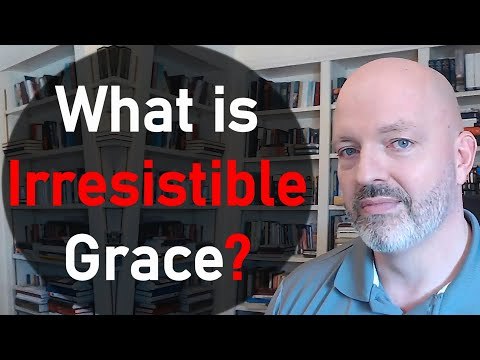
View On WordPress
#Calvinism#Calvinist#Christianity#doctrine of election#doctrine of salvation#doctrines of grace#doctrines of grace tulip#FIVE SOLAS#God#Jesus Christ#REFORMED AUDIO SERMON#reformed christian sermons#Reformed churches#reformed presbyterian#reformed sermons#reformed theology
0 notes
Note
(Just wanna say right off the bat, this isn’t meant to be a “gotcha” of any sort, this is something I’ve been genuinely worried about for a while) if Calvinism is the correct interpretation of the Bible, how do I know if I’m elect or not? I’ve fallen away from the faith a couple times, and though now I want to follow Jesus, I’m worried that the fact I decided to leave multiple times is a sign that God hasn’t chosen me. It really freaks me out. Do you think it’s still possible for me?
Oh wow. The first time I open my mouth on Tumblr about being a Calvinist, I get a toughie like this! ^^' Thanks for asking, and I'll do my best to be coherent and to the point. (Dear God, please give me the right words to say. Amen.)
Let me start off by saying that you shouldn't just take my word for it about anything I'm going to say. Measure everything against Scripture first and foremost, and if there's someone you trust with more theological expertise in your life, definitely run it past them as well. Also, let me just add that while Calvinism is the system of theology that makes the most sense to me, I'm sure it's not right about everything, because it's the result of finite human beings trying to make sense of the divine. I'll honestly be surprised if I get to heaven and find out that every denomination isn't wrong about something.
(Also, please excuse me if I end up overexplaining things; I don't know how familiar you might be with any of this.)
Now, if I understand things correctly (and can remember my doctrine classes from my college days -_-), Calvinism is actually not all that different when it comes to assurance of salvation than any other branch of Protestant Christianity. One of the defining doctrines of Calvinism is the perseverance of the saints, which in Calvinism refers to the teaching that if you have true faith in Jesus Christ, you can't lose your salvation. If God has elected you, then even if you reject the faith and walk away, your path will always lead back to Him in the end. One of the clearest verses I can think of that points to this is Philippians 1:6:
"And I am sure of this, that he who began a good work in you will bring it to completion at the day of Jesus Christ."
But it's worth noting that, even if you believe this, that still doesn't answer the question "Am I elect or not?" (Which is really asking, "Am I truly saved or not?" because the elect are the ones God predestined for salvation.)
It's a vitally important question, and I can definitely understand why that would be weighing on your heart, if you've fallen away from time to time. I think it's a question we all have to face at one point or another, whether you're a Calvinist who worries "maybe I'm not elect, which was why I fell away," or an Arminian who worries "I was saved before, but then I lost my salvation."
There are certainly indicators of whether your faith is real or not, just as you can often get a sense of whether someone else probably has genuine faith or not. "A tree is known by its fruit," after all. Things like whether your life is different now than it was before you turned to God, or whether you feel convicted by your sin, are good indicators. (And, you know...being worried that you might not be elect or saved can also be a pretty good sign that you don't actually have anything to worry about. If you didn't belong to God, why would you care?)
But at the end of the day, assurance of something is ultimately a feeling, not a scientific fact. I can't look at someone's DNA and see if they're elect or not - and that goes for myself too. Like so many other theological things, it's a matter of faith and trust.
Having assurance of your salvation is a bit like having assurance that someone loves you. Think of someone in your life who you know loves you - a parent, a best friend, a significant other, whatever - and ask yourself how you know that. There's probably evidence of it: They tell you they love you, you can see how they care for you with their actions, etc. But at the end of the day...do you really know what's going on in their head or their heart? No, you have to trust that they mean what they say.
And I do believe that God has something to say on the matter, such as what Jesus says in John 6:37, 40:
"All that the Father gives me will come to me, and whoever comes to me I will never cast out. ... For this is the will of my Father, that everyone who looks on the Son and believes in him should have eternal life, and I will raise him up on the last day."
There's no caveat in there about "unless they fall away for a time, then I don't want anything to do with them." And I don't think you'll find that anywhere else in scripture either.
On the contrary, Romans 8 says:
"He who did not spare his own Son but gave him up for us all, how will he not also with him graciously give us all things? ... Who shall separate us from the love of Christ? Shall tribulation, or distress, or persecution, or famine, or nakedness, or danger, or sword? ... No, in all these things we are more than conquerors through him who loved us. For I am sure that neither death nor life, nor angels nor rulers, nor things present nor things to come, nor powers, nor height nor depth, nor anything else in all creation, will be able to separate us from the love of God in Christ Jesus our Lord."
Did you hear that? Nothing in creation can keep you from God's love. Not even you.
If you're worried about your standing before God, I would encourage you to go ahead and ask Him about it directly. Christianity is first and foremost a relationship, and God always wants to talk with us. It might require time and patience before you get an answer, and it might be a question you have to keep asking Him again and again, but there's no better place to go for assurance about something like this than straight to the source. I think He would love to reassure you that you belong to Him.
Like the father in Mark 9: "I believe! Help my unbelief!"
And you know, don't think that Calvinists are immune to doubts about whether we're elect or not either. I grew up in a Christian home where my siblings and I were raised in a Reformed understanding of the Bible from day one, and all of us have wrestled with doubts about our salvation from time to time. Only by the grace of God and the work of the Holy Spirit can I rest in the assurance that I am His.
I pray that He'll work in your heart to give you that assurance as well.
"However weak you are, know that you are a Christian, whether you believe perfectly or imperfectly, even while weakness and a feeling of death and sin remain with you. To such a person we must say, Brother, your situation is not desperate, but pray…for the perfection of your faith."
- Martin Luther
#ask and you shall receive#anon asks#thanks for coming to my sermon#christianity#calvinism#assurance of salvation#doctrine of election#perseverance of the saints
1 note
·
View note
Text
#tv news#ronna mcdaniel#election denier#republican assholes#Jan 6th insurrection#Trump sycophant#Republican propagandist#republican hypocrisy#bring back the fairness doctrine
14 notes
·
View notes
Text
"Today, they are already a long way toward recapturing the White House in 2024, whether Trump or another Republican candidate wins the election or not."
This article (by a Republican) is lengthy and dense. You should read it anyway.
#Republicans#2024 election#independent state legislature doctrine#Supreme Court#alternative slates of electors#Electoral College#J. Michael Luttig#be afraid#be very afraid
9 notes
·
View notes
Text
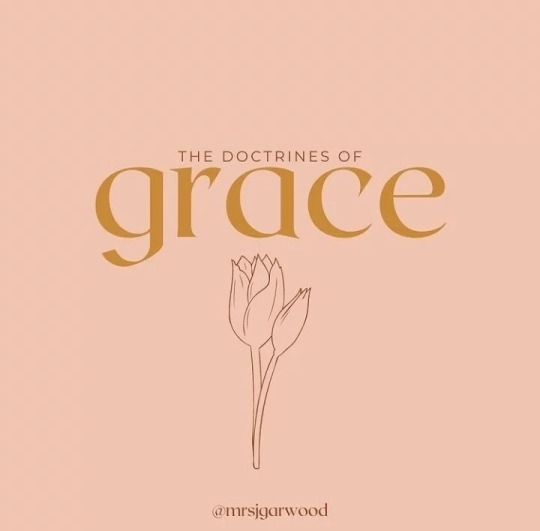




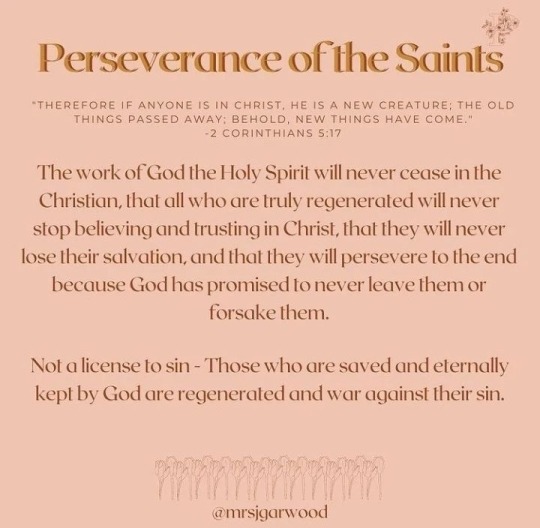
#TULIP#christian blog#christianity#christians#mrsjgarwood#total depravity#unconditional election#limited atonement#perseverance of the saints#the doctrines of grace#irresistible grace
3 notes
·
View notes
Text
.
#it annoys me to no end that my dad is breaking the jw rule just to vote for the conservative option on the upcoming election#like we just follow jw doctrine when it's convenient for you huh? isn't that funny?#but when it comes to hating them gays. boy oh boy are we citing the government body's tight pants discourse#hmm.#like. pretty much no one in my family is a jw anymore except for my dad#and sadly i think jw's beliefs are right up his alley#he's such a conspiratorial person..... and the older i get the worse it gets it seems#because he finally has no problem talking to us about it. and it ALWAYS kills the mood lol#the other day at lunch he said 'when the country becomes just like (insert country in crisis) i will bring that up to you til the end'#and my mom was like '....bro chill. that's your daughter you're talking to'#and i was like 'nah mom it's fine. super okay that my dad treats me like the weight of the world is on my morals'#like what a fucking weirdo he is amirite lesbians and gays hahaha i'm so tired
4 notes
·
View notes
Text
1 Corinthians 1:1-3: To the Church of God Which Is At Corinth
youtube
View On WordPress
#Abraham#Athens#Calvary#Christ#Church#Corinth#Cross#Doctrine#elect#Faith#False Gospel#false teaching#Father#forgiveness#free will#God#Good News#Gospel#Grace#Hagar#Heaven#Holy Spirit#Hope#Jesus#Kingdom#Law#Love#passion#Priority#Repent
0 notes
Link
There will be tribulation and distress for every soul of mankind who does evil, for the Jew first and also for the Greek, but glory, honor, and peace to everyone who does what is good, to the Jew first and also to the Greek. For there is no partiality with God.
#1646#audio#baptist#confession#doctrine#election#forgivenenss#podcast#punishment#puritan#reformed#salvation
0 notes
Quote
Although [Jonathan] Edwards had fought earlier against the biblical doctrine of divine sovereignty – a truth he once called a “horrible doctrine” – through personal study, he had become convinced that God irresistibly orders salvation of His chosen people, and he soon arose to be a guardian of this sacred truth.
Steven Lawson
14 notes
·
View notes
Text
What About Human Responsibility?
Jesus has so far affirmed Pharisee soteriology. God first loves an individual. In response to God’s love, the individual cares to keep God’s Law. If a person keeps God’s Law, that person is righteous. God’s love is what brought the person into righteousness (i.e. saved the person). When the person kept the Law, that was evidence that he had been made righteous by God. This is the soteriological…

View On WordPress
#adoption#andrew paul#bible study#born in sin#calvinism#Christian#Christianity#Christoa#commentary#conceived in iniquity#determinism#doctrine of salvation#election#essene#fatalism#free#human responsibility#in the Bible#intervention#john 3#meaning#pharisee#predestination#sadducee#salvation#Sermon#sovereignty of God
0 notes
Text
Who Did Jesus Die on the Cross For According to Scripture? - Pastor Patrick Hines Podcast
Who Did Jesus Die on the Cross For According to Scripture? – Pastor Patrick Hines Podcast
Who Did Jesus Die on the Cross For According to Scripture? – Pastor Patrick Hines Podcast
“And she will bring forth a Son, and you shall call His name Jesus, for He will save His people from their sins.” (Matthew 1:21 / New King James Version)
▶️Reformed Presbyterian Pulpit Supplemental (Pastor Hines’ YouTube Channel):https://www.youtube.com/channel/UClW5Qzh27Zx7HO2fKkCcR5g
▶️Bridwell Heights…
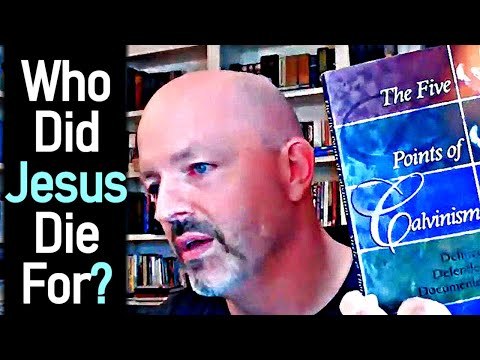
View On WordPress
#CALLING AND ELECTION#Calvinism#Calvinist#christ crucified#doctrine of election#Jesus#Jesus Christ#predestination#Predestination and Calling#reformed audio sermons#reformed christian sermons#reformed preachers#reformed presbyterian churches#reformed presbyterians#reformed sermons#reformed theology
0 notes
Text
Ghost Rider and the Lost Souls Contract of the Liddle Dirty Dentures Diapered Dementia Dumb Chump Vermin of Marred-A-LAME0, donnie j. trump: Supplemental: Part 2/2.




2 Corinthians 12:5
I will boast about a man like that, but I will not boast about myself, except about my weaknesses.
2 Corinthians 12:6
Even if I should choose to boast, I would not be a fool, because I would be speaking the truth. But I refrain, so no one will think more of me than is warranted by what I do or say,
2 Corinthians 12:7
or because of these surpassingly great revelations. Therefore, in order to keep me from becoming conceited, I was given a thorn in my flesh, a messenger of Satan, to torment me.
2 Corinthians 12:8
Three times I pleaded with the Lord to take it away from me.
2 Corinthians 12:9
But he said to me, “My grace is sufficient for you, for my power is made perfect in weakness.” Therefore I will boast all the more gladly about my weaknesses, so that Christ’s power may rest on me.
2 Corinthians 12:10
That is why, for Christ’s sake, I delight in weaknesses, in insults, in hardships, in persecutions, in difficulties. For when I am weak, then I am strong.
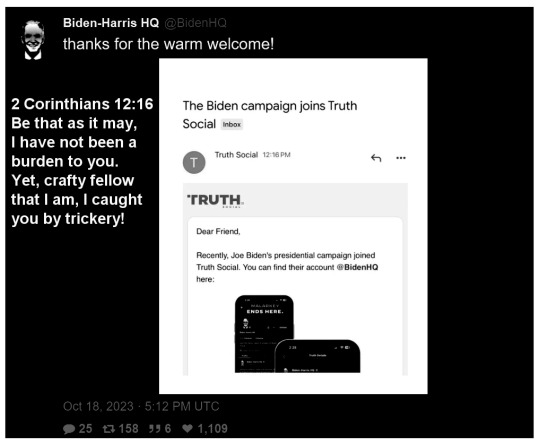


"Hold on to hope. Keep it alive. We have to be greater than what we suffer. My wish for you is to become hope. People need that. And even if we fail, what better way is there to live?" - Peter Watches Gwen's Graduation Speech | The Amazing Spider-Man 2 (Andrew Garfield, Emma Stone)
youtube
Released: May 2, 2014 (122nd day)
Published by: Carl
Duration: 4:57 (297 seconds)
https://www.youtube.com/watch?v=O5MGVvaiQ8s
O5MGVvaiQ8s (5, 8)
OMGVvaiQs
agimoqsvv
1+7+9+30+50+70+90+700+700=1657. 1657+297=1954. 1954+122=2076.
Strong's Concordance #2076
zabach: to slaughter for sacrifice
Original Word: זָבַח
Mark 14:32
They went to an olive grove called Gethsemane, and Jesus said to his disciples, “Sit here while I pray.”
Mark 14:33
He took Peter, James and John along with him, and he began to be deeply distressed and troubled.
Mark 14:34
“My soul is overwhelmed with sorrow to the point of death,” he said to them. “Stay here and keep watch.”
Mark 14:35
Going a little farther, he fell to the ground and prayed that if possible the hour might pass from him.
Mark 14:36
“Abba, Father,” he said, “everything is possible for you. Take this cup from me. Yet not what I will, but what you will.”
Mark 14:37
Then he returned to his disciples and found them sleeping. “Simon,” he said to Peter, “are you asleep? Couldn’t you keep watch for one hour?
Romans 5:8
But God demonstrates his own love for us in this: While we were still sinners, Christ died for us.
Captain Marvel - I'm only human…What happens when I'm finally set free?
youtube
March 8, 2019 (67th day)
Duration: 2:49 (169 seconds)
https://www.youtube.com/watch?v=h2u0yZYI0SQ
h2u0yZYI0SQ (2, 0, 0)
huyZYISQ
hiqsuyyz
8+9+70+90+200+400+400+500=1677. 1677+2+0+0=1679. 1679+169=1848. 1848+67=1915.
Strong's Concordance #1915
hadak: to crush with the foot, to cast or tread down, to shut up, to silence, to be silent
Original Word: הָדךְ
Captain Marvel - Time to protect humanity from its enemies…
youtube
March 8, 2019 (67th day)
Duration: 2:53 (173 seconds)
https://www.youtube.com/watch?v=_saMxjG7eOs
_saMxjG7eOs (7)
saMxjGeOs
aegjmossx
1+5+7+600+30+50+90+90+300=1173. 1173+7=1180. 1180+173=1353. 1353+67=1420.
Strong's Concordance #1420
gedullah: greatness; mighty acts, dignity, great things, majesty.
Original Word: גִּדוּלָה
Avengers: Endgame - When Momma Ain't Happy…
youtube
April 26, 2019 (116th day)
Duration: 3:24 (204 seconds)
https://www.youtube.com/watch?v=LMLJPDPVlUc
LMLJPDPVlUc
LMLJPDPVlUc
cdjlllmppuv
3+4+600+20+20+20+30+60+60+200+700=1717. 1717+204=1921. 1921+116=2037.
Strong's Concordance #2037
Harum: to tower up, high; Rome; a descendant of Judah
Original Word: הָרֻם
Avengers: Endgame - Every Action Has An Equal and Opposite Reaction…
youtube
April 26, 2019 (116th day)
Duration: 4:53 (293 seconds)
https://www.youtube.com/watch?v=-NRm5XZFV7A
NRm5XZFV7A (5, 7)
NRmXZFVA
afmnrvxz
1+6+30+40+80+700+300+500=1657. 1657+5+7=1669. 1669+293=1962. 1962+116=2078.
Strong's Concordance #2078
Zebach: a slaughter, a sacrifice (the victim or the act) -- offer(- ing); a Midianite king
Original Word: זֶבַח
The greatness of Rome was sacrificed (Hebrew): הָדךְ גִּדוּלָה הָרֻם זֶבַח
This is the place where the Romans sacrificed (Hebrew): הָ ד ךְ גִּ דוּלָ ה הָרֻם זֶבַח
God is the Lord of the Holy Spirit (Yiddish): הָ ד ךְ גִּ דוּלָ ה הָרֻם זֶבַח
This is all from Wikipedia as well to highlight that Jesus Christ wasn't being antisemitic or a traitor, he was being a freedom fighter for all native Israelis against actual Roman-loyalist traitors:
In Jerusalem, Herod introduced foreign forms of entertainment, and erected a golden eagle at the entrance of the Temple, which suggested a greater interest in the welfare of Rome than of Jews. Herod's taxes garnered a bad reputation: his constant concern for his reputation led him to make frequent, expensive gifts, increasingly emptying the kingdom's coffers, and such lavish spending upset his Jewish subjects.
The two major Jewish sects of the day, the Pharisees and the Sadducees, both showed opposition to Herod. The Pharisees were discontented because Herod disregarded many of their demands with respect to the Temple's construction.
The Sadducees, who were closely associated with priestly responsibilities in the Temple, opposed Herod because he replaced their high priests with outsiders from Babylonia and Alexandria, in an effort to gain support from the Jewish Diaspora.
Herod's outreach efforts gained him little, and at the end of his reign anger and dissatisfaction were common amongst Jews. Heavy outbreaks of violence and riots followed Herod's death in many cities, including Jerusalem, as pent-up resentments boiled over. The scope of the disturbances sparked hopes that the Jews of Judea might some day overthrow the Roman overlords, hopes reawakened decades later in the outbreak of the First Jewish-Roman War in 66 CE.
Roman historian Tacitus referred to "Christus" and his execution by Pontius Pilate in his Annals (written c. AD 116), book 15, chapter 44.
Nero fastened the guilt and inflicted the most exquisite tortures on a class hated for their abominations, called Christians by the populace.
Christus, from whom the name had its origin, suffered the extreme penalty during the reign of Tiberius at the hands of one of our procurators, Pontius Pilatus, and a most mischievous superstition, thus checked for the moment, again broke out not only in Judaea, the first source of the evil, but even in Rome, where all things hideous and shameful from every part of the world find their centre and become popular. Accordingly, an arrest was first made of all who pleaded guilty; then, upon their information, an immense multitude was convicted, not so much of the crime of firing the city, as of hatred against mankind. Mockery of every sort was added to their deaths. Covered with the skins of beasts, they were torn by dogs and perished, or were nailed to crosses, or were doomed to the flames and burnt, to serve as a nightly illumination, when daylight had expired. Nero offered his
gardens for the spectacle, and was exhibiting a show in the circus, while he mingled with the people in the dress of a charioteer or stood aloft on a car.
Hence, even for criminals who deserved extreme and exemplary punishment, there arose a feeling of compassion; for it was not, as it seemed, for the public good, but to glut one man's cruelty, that they were being destroyed. (Wikipedia)
After Constantine the Great's in 321 and the Council of Laodicea from 363, the Christian rulers decided that the commandment of God is no more valid, now being needed to follow the commandments of people, switching in this sense the day of rest to Sunday, and by 361 AD it had become a mandated weekly occurrence.
“Our regard for the Lord’s resurrection, which took place on the Lord’s Day, will lead us to celebrate it on the same principle ”
“And all things whatsoever that it was the duty to do on the Sabbath, these we have transferred to the Lord’s Day as more honorable than the Jewish Sabbath.”
“Christians ought not to Judaize and to rest in the Sabbath, but to work in that day; but preferring the Lord’s Day, should rest, if possible, as Christians. Wherefore if they shall be found to Judaize, let them be accursed from Christ.” (Wikipedia)
In Christian eschatology, the Antichrist refers to people prophesied by the Bible to oppose Jesus Christ and substitute themselves in Christ's place before the Second Coming. (Wikipedia)
The term Antichrist (including one plural form) is found four times in the New Testament, solely in the First and Second Epistle of John. The Antichrist is announced as the one "who denies the Father and the Son."
The similar term pseudokhristos or "false Christ" is also found in the Gospels. In Matthew (chapter 24) and Mark (chapter 13), Jesus alerts his disciples not to be deceived by the false prophets, who will claim themselves to be the Christ, performing "great signs and wonders". Three other images often associated with the Antichrist are the "little horn" in Daniel's final vision, the "man of sin" in Paul the Apostle's Second Epistle to the Thessalonians, and the Beast of the Sea in the Book of Revelation. (Wikipedia)
Here's what happened to the Romans 55 years after they activated the curses of 1 Kings 1-9 by implementing the antisemitic, genocidal, ethnic cleansing, antichrist/satanic Sunday "Lord's Day":
In 376, unmanageable numbers of Goths and other non-Roman people, fleeing from the Huns, entered the Empire. In 395, after winning two destructive civil wars, Theodosius I died, leaving a collapsing field army, and the Empire, still plagued by Goths, divided between the warring ministers of his two incapable sons. Further barbarian groups crossed the Rhine and other frontiers and, like the Goths, were not exterminated, expelled or subjugated. The armed forces of the Western Empire became few and ineffective, and despite brief recoveries under able leaders, central rule was never effectively consolidated.
By 476, the position of Western Roman Emperor wielded negligible military, political, or financial power, and had no effective control over the scattered Western domains that could still be described as Roman. Barbarian kingdoms had established their own power in much of the area of the Western Empire. In 476, the Germanic barbarian king Odoacer deposed the last emperor of the Western Roman Empire in Italy, Romulus Augustulus, and the Senate sent the imperial insignia
to the Eastern Roman Emperor Zeno. While its legitimacy lasted for centuries longer and its cultural influence remains today, the Western Empire never had the strength to rise again. The Eastern Roman, or Byzantine Empire, survived and remained for centuries an effective power of the Eastern Mediterranean, although it lessened in strength.
Additionally, while the loss of political unity and military control is universally acknowledged, the fall of Rome is not the only unifying concept for these events; the period described as late antiquity emphasizes the cultural continuities throughout and beyond the political collapse. (Wikipedia)
#holy bible#tanakh#christianity#judaism#christian faith#jesus christ#bible study#bible scripture#bible verse#christian living#christian life#christian doctrine#donald trump#trump 2024#2024 elections#gop#republicans#evangelicals#antichrist#messiah
0 notes
Text
In the law, there's this idea called the "last clear chance" doctrine.
If you are in an accident, and you had the last clear chance to avoid the accident, then you are, at least in some portion, responsible for the accident.
For instance, if you are driving and a car pulls out in front of you, and you could've slammed on the brake but do not, you're responsible for that, even if the turn the other car made was illegal. Moreover, you might be held partially responsible for the other person's injuries, depending on how things work in your location.
This is even true if you can merely mitigate the damage. If you have a chance to limit the damage -- again, let's say you don't brake and the result is a collision at 40MPH instead of 10MPH -- the additional damage you cause could be considered your fault.
To me, this seems very applicable to voting.
The two parties in the US are going to put a couple of candidates up in the next few months. Both of them might be dangerous. But in the end, everyone who can vote is going to have one last, clear chance to avoid, or at least mitigate, damage.
It sucks that both parties are out there driving like maniacs.
But the fact of the matter is, they've put us in this position. And if you don't put on the brakes -- that is, at least mitigate damage -- you are responsible for the additional damage caused.
In the national elections, a choice not to vote for Biden is a choice not to brake when some jerk pulls into your lane. And if there's an accident and a lot of damage -- to voting rights in general, to reproductive rights, to the health and safety and life of trans and other queer people, to education, to the environment -- then you are responsible for not attempting mitigation.
You have the last clear chance to minimize danger and damage. And while you can yell until you're blue in the face that the Democratic party put you in that position in the first place by not running another candidate, you are still responsible even if you try to abdicate that responsibility.
6K notes
·
View notes